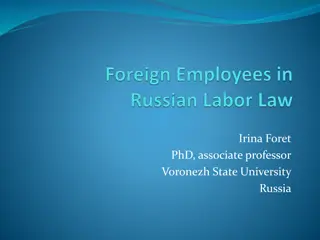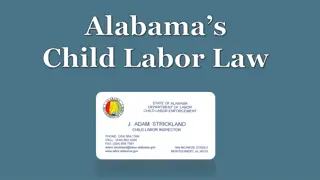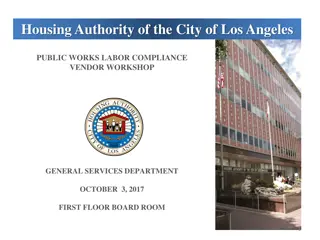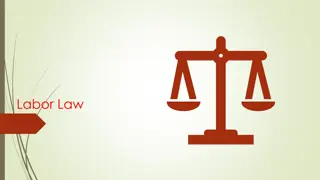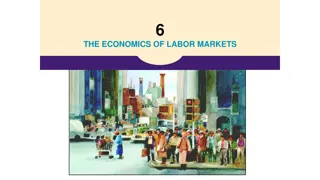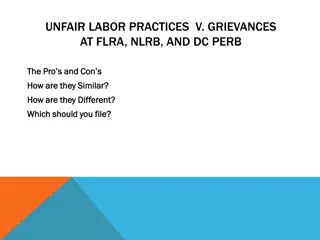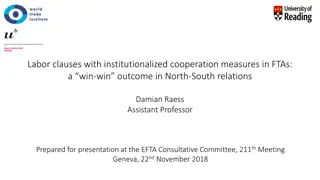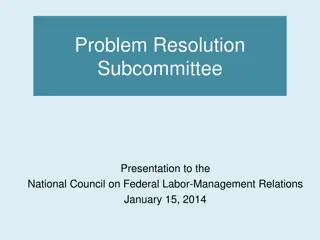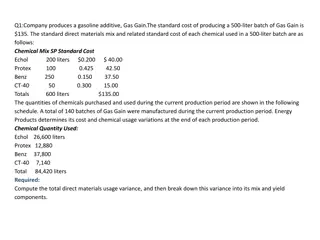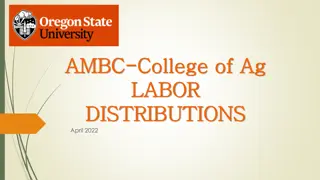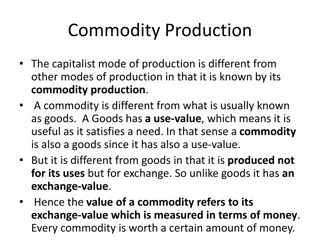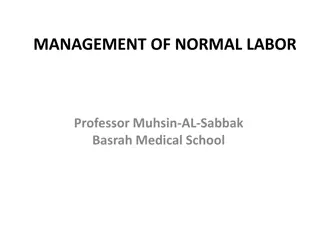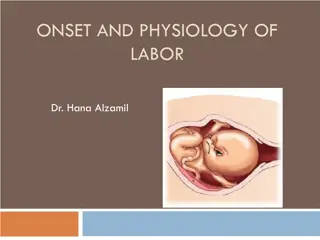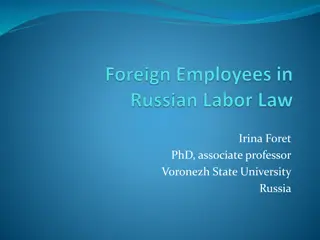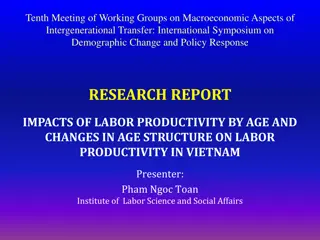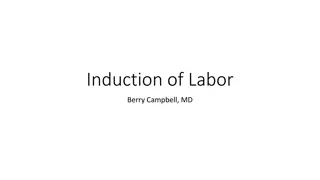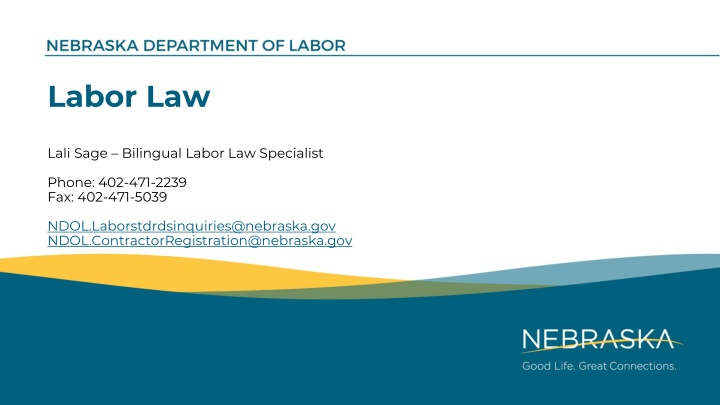
Nebraska Labor Laws Overview: Wage Payment and Collection Act
Explore Nebraska labor laws including the Wage Payment and Collection Act enforced by the Nebraska Department of Labor. Learn about employee rights, filing complaints, employer obligations, and more.
Uploaded on | 0 Views
Download Presentation

Please find below an Image/Link to download the presentation.
The content on the website is provided AS IS for your information and personal use only. It may not be sold, licensed, or shared on other websites without obtaining consent from the author. If you encounter any issues during the download, it is possible that the publisher has removed the file from their server.
You are allowed to download the files provided on this website for personal or commercial use, subject to the condition that they are used lawfully. All files are the property of their respective owners.
The content on the website is provided AS IS for your information and personal use only. It may not be sold, licensed, or shared on other websites without obtaining consent from the author.
E N D
Presentation Transcript
Labor Law Lali Sage Bilingual Labor Law Specialist Phone: 402-471-2239 Fax: 402-471-5039 NDOL.Laborstdrdsinquiries@nebraska.gov NDOL.ContractorRegistration@nebraska.gov
Nebraska Labor Laws Wage Payment & Collection Act (WPCA) Wage Payment & Collection Act (WPCA) Lunch Period Law Lunch Period Law Contractor Registration Act (CRA) Contractor Registration Act (CRA) Employee Classification Act (ECA) Employee Classification Act (ECA) Child Labor Law Child Labor Law
Wage Payment & Collection Act Neb. Rev. Stat. 48-1228 to 48-1234 The Nebraska Department of Labor (NDOL) is responsible for enforcement of the Wage Payment and Collection Act (WPCA). As part of the administration of the WPCA, the Department receives complaints and follows up with an investigation into the alleged violations.
Wage Payment & Collection Act Everyone has the right to file a wage complaint. However, NDOL only has jurisdiction on complaints filed by employees employees, who have or had an employment relationship with an employer. employees or former NDOL has jurisdiction only on wages earned while physically working in NE. NDOL has a statute of limitation of 4 years to investigate a possible violation of the WPCA.
Wage Payment & Collection Act Employer Employer means the state or any individual, partnership, limited liability company, association, joint-stock company, trust, corporation, political subdivision, or personal representative of the estate of a deceased individual, or the receiver, trustee, or successor thereof, within or without the state, employing any person within the state as an employee.
Wage Payment & Collection Act Employee Employee means any individual permitted to work by an employer pursuant to an employment relationship or who has contracted to sell the goods or services of an employer and to be compensated by commission.
Wage Payment & Collection Act Employers Must: Employers Must: Set regular paydays and pay all wages due their employees on those days. Provide or make available paystubs (wage statements) on each regular payday. Final paychecks are due on next regular payday or within 2 weeks of termination, whichever is sooner.
Wage Payment & Collection Act Paystubs Paystubs - On each regular payday, the employer shall deliver or make available to each employee, by mail or electronically, or shall provide at the employee's normal place of employment during employment hours for all shifts a wage statement showing, at a minimum: the identity of the employer identity of the employer, the hours for which the employee was paid which the employee was paid, the wages earned by the employee wages earned by the employee, and deductions deductions made for the employee. hours for
Wage Payment & Collection Act Fringe benefits Fringe benefits includes sick and vacation leave plans, disability income protection plans, retirement, pension, or profit-sharing plans, health and accident benefit plans, and any other employee benefit plans or benefit programs regardless of whether the employee participates in such plans or programs.
Wage Payment & Collection Act Wages Wages - means compensation for labor or services rendered by an employee, including fringe benefits, when previously agreed to and conditions stipulated have been met by the employee, whether the amount is determined on a time, task, fee, commission, or other basis. Paid leave Paid leave - other than earned but unused vacation leave, provided as a fringe benefit by the employer shall not be included in the wages due and payable at the time of separation, unless the employer and the employee or the employer and the collective-bargaining representative have specifically agreed otherwise.
Wage Payment & Collection Act Thirty days' written notice shall be given to an employee before regular paydays are altered by an employer. An employer may deduct, withhold, or divert a portion of an employee's wages only when the employer is required to or may do so by state or federal law or by order of a court of competent jurisdiction or the employer has a written agreement with the employee to deduct, withhold, or divert. Wages of an employee cannot be dropped below min. wage. $9.00 $9.00 per hour is NE min. wage.
Wage Payment & Collection Act An employer shall not retaliate or discriminate against an employee because the employee: - Files a suit or complaint under the Nebraska Wage Payment and Collection Act; or - Testifies, assists, or participates in an investigation, proceeding, or action concerning a violation of the act.
How does this process work? 1. Worker being affected files a wage complaint online at https://dol.nebraska.gov/LaborStandards/WageComplaint/WageComplai ntForm 2. Complaint is assigned to an agent who contacts the complainant to request further information and documentation. 3. Then the employer is contacted to provide their side of the story and documentation. 4. If the employer does not reply by the deadline provided. The documentation is subpoenaed. 5. If based on documentation available, the agent determines wages are owed. The employer is asked to pay. 6. If the employer pays wages due, the case is closed. If not, a citation is issued against the employer.
Case 1: 1. Anna (employee) quit her job with ABC (employer) on 6/16/21. According to Anna, the employer was refusing to issue her final check, unless she signed some paperwork. Anna stated she was owed 28 hours of work at $15.50/hr ($434.00 gross) 2. Anna filed a wage complaint on 7/6/21. 3. I spoke to ABC on 7/13/21 and the employer stated they were retaining the complainant s final check because she was refusing to sign some papers. Employer was explained this goes against WPCA. 4. Employer paid all the wages due to Anna on 7/16/21 via direct deposit. 5. No citation was issued.
Case 2: Lynn (employee) was discharged on 11/1/20 from XYZ (employer). Lynn filed a wage complaint on 12/11/20. According to Lynn, XYZ would not issue her final check in the gross amount of $432.00 (40 hours of work at $10.80/hr). The employer provided the documentation after a subpoena was issued. XYZ admitted they were withholding Lynn s final check due to timecard theft . XYZ filed a police report, but no charges were made. A determination was sent to employer to pay the wages due. Wages were not paid by the deadline provided, and a citation was issued against the employer. The next step for Lynn was to take her case to court.
Case 3: Kate (employee) was discharged from LMN (employer) on 6/1/21 and was not paid her remaining balance of unused/accrued PTO with her final check. Kate filed a wage complaint on 6/7/21. According to Kate, the employer told her she was not entitled to those wages per their company policy. LMN was contacted and stated that Kate was not entitled to PTO pay based on their company policy If appropriate notice of two weeks or 30 days is not provided and completed, all accrued PTO will not be payable. LMN was explained that their PTO company policy went against the WPCA, to pay the amount due and change their policy. Kate was paid 90.7 hours of accrued/unused PTO at $22.12/hr, totaling in the gross amount of $2,006.28. No citation was issued.
Lunch Period Law Neb. Rev. Stat. 48-212 to 48-213 Any person, firm, or corporation owning or operating an assembling plant, workshop, or mechanical establishment plant, workshop, or mechanical establishment employing one or more persons shall allow all of their employees not less than thirty consecutive minutes for lunch consecutive minutes for lunch in each eight in each eight- -hours shift, time it shall be unlawful for any such employer to require such employee or employees to remain in buildings or on the premises where their labor is performed. Any employer violating any of the provisions shall be guilty of a Class III misdemeanor. assembling not less than thirty hours shift, and during such
Contractor Registration Act Neb. Rev. Stat. 48-2101 to 48-2117 CRA requires contractors and subcontractors doing business in NE to register with NDOL A contractor is any person who engages in the business of construction and includes subcontractors, general contractors, and any other person arranging for the performance of work on real property.
Contractor Registration Act There is a $25.00 annual registration fee. A person who is self-employed (sole proprietorship) and does not pay more than $3,000.00 annually to employ others in the business can be exempt from the fee.
Contractor Registration Act Out of state contractors: - There is $25.00 annual registration fee, plus a one-time fee of $25.00 - Are required to pay a $25.00 project permit fee for any projects over $10,000.00
Contractor Registration Act What happens to contractors that are not in compliance? What happens to contractors that are not in compliance? - The administrative penalty shall be not more than $500.00 in the case of a 1st violation and not more than $5,000.00 in the case of a 2nd or subsequent violation. - All contractors making payments to another contractor, who is NOT listed on the combine database, are required to withhold and remit 5% of all payments to such contractor. This payment is to be submitted as withholding tax to the Dept. of Revenue.
Employee Classification Act Neb. Rev. Stat. 48-2901 to 48-2912 This law provides protection to workers in the construction and delivery services from misclassification as subcontractors for the purpose of tax withholding, unemployment insurance withholding, unemployment insurance and worker s compensation insurance benefits. of tax worker s compensation
ECA - What is the definition of an employee? Does NOT own and operate his/her own business Taxes are taken off checks (W-2) NOT registered with NDOL Does NOT have the freedom to choose which jobs he/she wants to accept, including when and where to perform the work Does NOT have the freedom to hire anyone they want to work with on the job Usually, employees do not provide tools and materials to perform the work
Employee Classification Act What happens to contractors that are found to be in violation of this act? What happens to contractors that are found to be in violation of this act? First offense - up to $500.00 citation to contractor per misclassified worker Second offense - up to $5,000.00 citation to contractor per misclassified worker Any contractor that has unpaid fines for violation of the ECA shall be barred from contracting with the state or any political subdivision until such fines are paid.
Nebraska Child Labor Law Neb. Rev. Stat. 48-301 to 48-313 12 years-old and under shall NOT work in detasseling or ANY job, unless their parents own the business.
Nebraska Child Labor Law 14 and 15 year 14 and 15 year- -olds: - Cannot work before 7am and after 7pm during school season. - Can work only 3 hours on a school day and can work 8 hours on a non-school day. - Can work 18 hours during a school week and can work 40 hours on a non-school week. olds: - The minor needs to have a job offer to be able to get their work permit that needs to be filled out by the minor and then by an issuing officer of the school the minor goes to. Once the permit is filled out, this is provided to our office. 16 year-olds and older can work without any hour restrictions and at any job that is not hazardous (for details contact USDOL)
Nebraska Child Labor Law Performing Arts $10 fee for performing arts permit This permit waives hour restrictions This permit expires 90 days after it was issued



